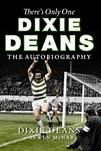 The Autobiography
The Autobiography
by Dixie Deans with Ken McNab
Birlinn, £16.99
Reviewed by Jonathan O'Brien
From WSC 300 February 2012
It requires little brainpower to work out how John Deans, Celtic's powerhouse striker of the early 1970s, came by his nickname. But it seems even that was beyond some people. Early on in this autobiography, a well-known horseracing pundit accosts Deans at a function and slaps his back, under the impression he has just met the Evertonian Dixie Dean instead. "For me to be Dixie Dean, I would have had to be about 90," he writes. "I must look like I had a hard paper round."
Deans was a fine foil for the more skilful Kenny Dalglish at Celtic, where they played together for five seasons. Rangers considered signing him in 1969, but aborted the transfer when they discovered his mother was a Catholic. Curiously, he never managed to grab a goal in the Glasgow derby, a fact that was seized on by the more headbangerish end of the Celtic support. He scored against everybody else, however, including six past Alan Rough in one game against Partick Thistle.
Yet Deans's Celtic career will be remembered primarily for one thing, and he knows it. In April 1972, a Celtic team that was past its late-1960s peak but still a formidable outfit faced Inter in the European Cup semi-final. The first leg finished goalless. So did the second. Deans, a substitute, took Celtic's first penalty in the shoot-out and smashed it narrowly over the bar. All the other kicks were converted and Inter went through.
Jock Stein lost his rag with Deans – not for the missed penalty, but for participating in a somewhat ill-advised photo opportunity the next day. Deans posed at a bus-stop for a newspaper picture, which was subsequently headlined Dixie Deans, the loneliest man in the world. It says something about Deans's innate ebullience that he ends this chapter by concluding that Stein's own supposed blunder – not playing him from the start – was greater than his own.
Booze put paid to Deans's marriage and there are echoes here of another recent Celtic autobiography – that of the troubled midfielder George Connelly. In this case, however, it was primarily the player's wife who had the real problem, resulting in a large amount of domestic violence against Deans himself. Speaking of Connelly, Deans here dispels the longstanding rumour that he slept with his team-mate's spouse: "It would have been worse than incest."
Were he around today, Deans would probably have won about 80 caps for Scotland's parched-dry national team. Instead, he won just two. He blames the saintly Stein, who he is convinced was whispering in Scotland manager Willie Ormond's ear not to select him. While there is sometimes an undeniable whiff of the grizzled old lag sitting at the end of the bar telling you earnestly it should have been him, goddammit, ghostwriter Ken McNab has laid out the story in a believable, no-frills voice that does his subject plenty of justice. No classic, but an enjoyable and sparky read.